Download our trifold advocacy flyer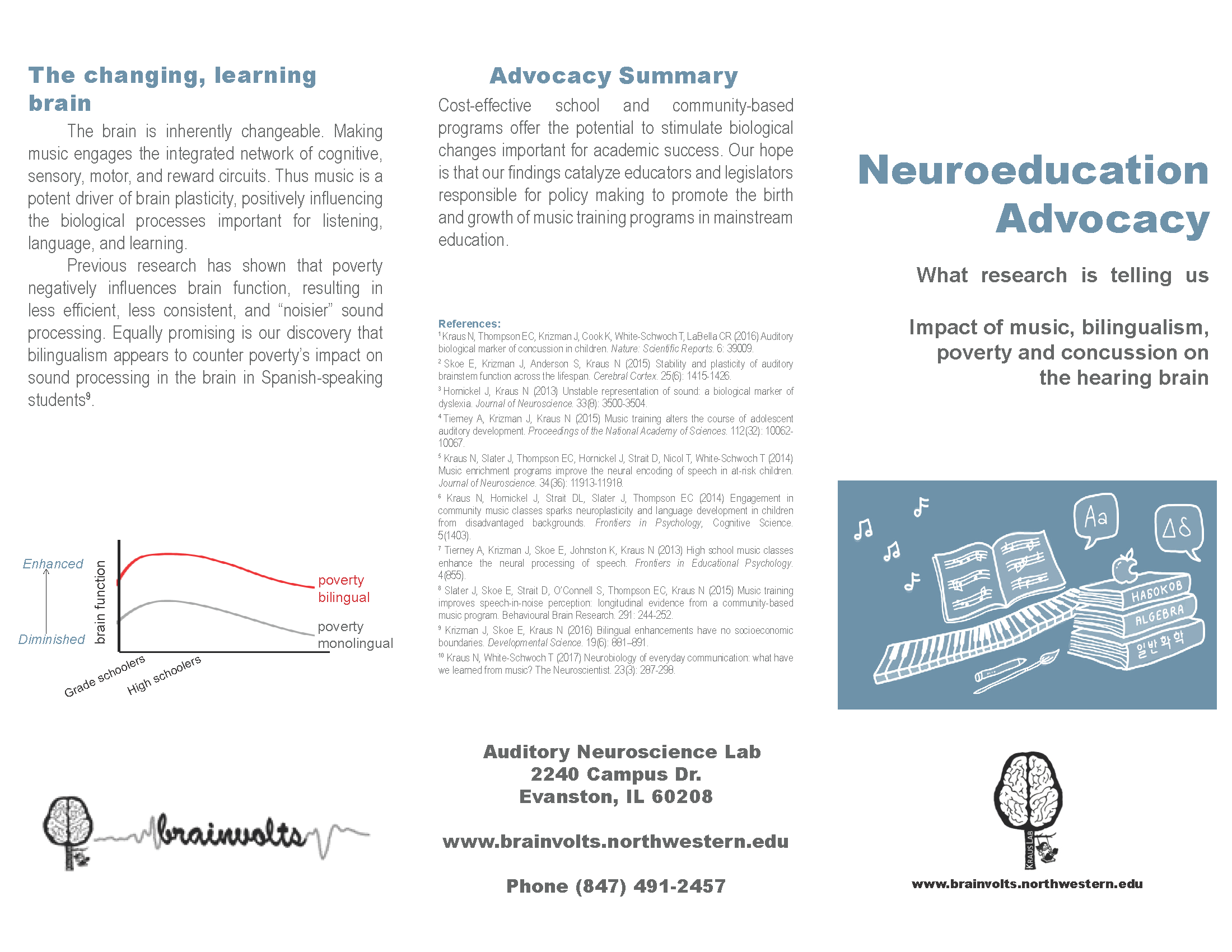
WHAT RESEARCH IS TELLING US
MUSIC, BILINGUALISM, POVERTY AND CONCUSSION IMPACT THE HEARING BRAIN
MUSIC CAN BOOST SOUND AND LANGUAGE PROCESSING IN THE BRAIN
Making music changes the brain, with tangible impact on listening, language, learning, social connection and cognition. Most research has focused on children taking private lessons. Through multiyear partnerships with inner-city schools and community programs, the Kraus Lab tells a new and promising story.
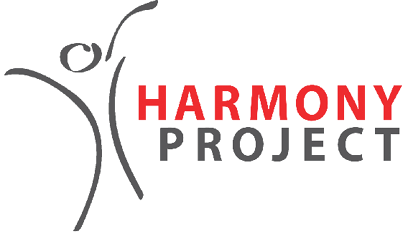
COMMUNITY MUSIC PROGRAMS FOR GRADE SCHOOLERS
We partnered with Harmony Project, a community mentorship program that provides free music instruction to children in Los Angeles gang reduction zones. After two years—but not one—music training sharpened speech processing in the brain to strengthen literacy and listening skills. The more active students (those who played an instrument, compared to those who took music appreciation classes) made greater gains. Moreover, literacy skills declined in the no-music control group (as expected for students from low income families), wheareas music students stayed on track with national norms. Finally, the ability to understand speech in noisy environments improved in the music group.

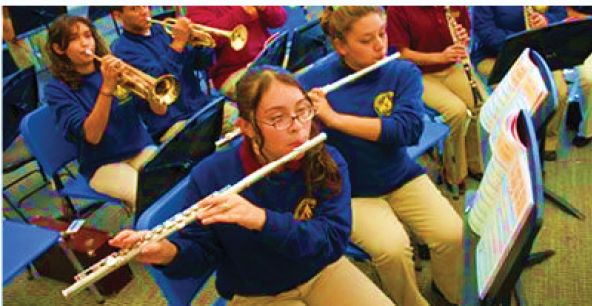
IN-SCHOOL MUSIC FOR HIGH SCHOOLERS
In a second partnership we worked with the Chicago Public Schools, to investigate the impact of music training initiated during adolescence. Starting music lessons as late as high school still enriched neural processing. Again, gains were apparent only after two years of training. We found that music students’ neural responses to speech were less compromised by background noise compared to their peers in a fitness-based program. Both enrichment programs require discipline and time investment but only music demands the development of sound-to-meaning connections. By the third year of music training, brain responses matured faster and showed enhanced processing of sound details. Literacy performance improved in all children, with largest gains for the music group.
THE CHANGING, LEARNING BRAIN
The brain is inherently changeable. Making music engages the integrated network of cognitive, sensory, motor, and reward circuits. Thus music is a potent driver of brain plasticity, positively influencing the biological processes important for listening, language, and learning.
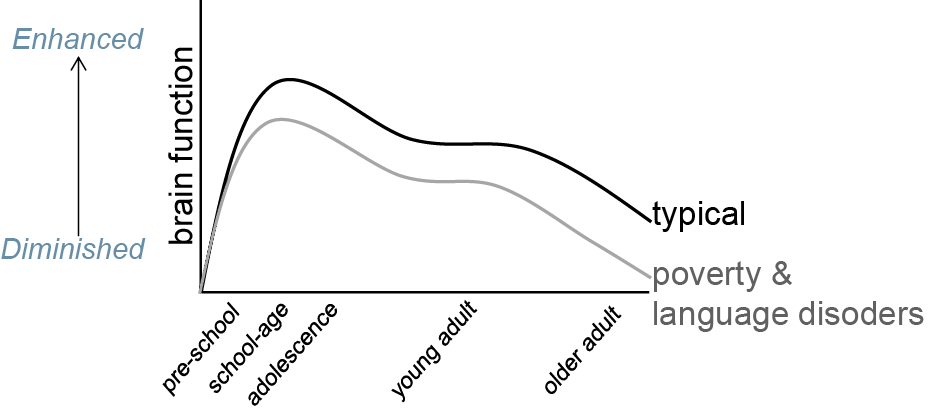
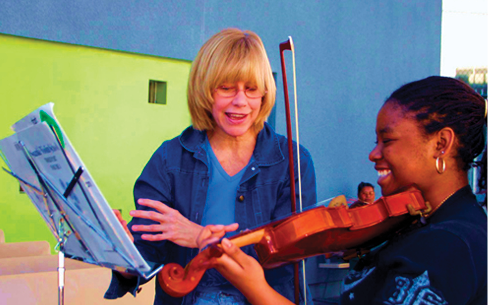
MUSIC ADVOCACY
Cost-effective school- and community-based programs offer the potential to stimulate biological changes important for academic success. Our hope is that our findings catalyze educators and legislators responsible for policy making to promote the birth and growth of music training programs in mainstream education.
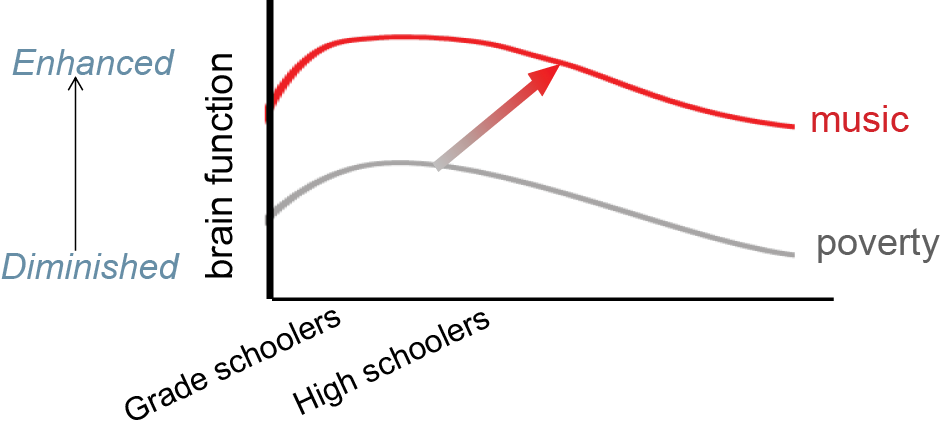
WHAT DISRUPTS OUR ABILITY TO MAKE SENSE OF SOUND?
POVERTY AND LANGUAGE DISORDERS
Developmental language disorders can diminish sound processing in the brain. Our research tells us that brain functions important for classroom learning are often diminished in at-risk children.
Poverty negatively influences brain function, resulting in less efficient, less consistent, and “noisier” sound processing. Music training can help erase this poverty signature. Equally promising is our discovery that bilingualism appears to counter poverty’s impact on sound processing in the brain in Spanish-speaking students.
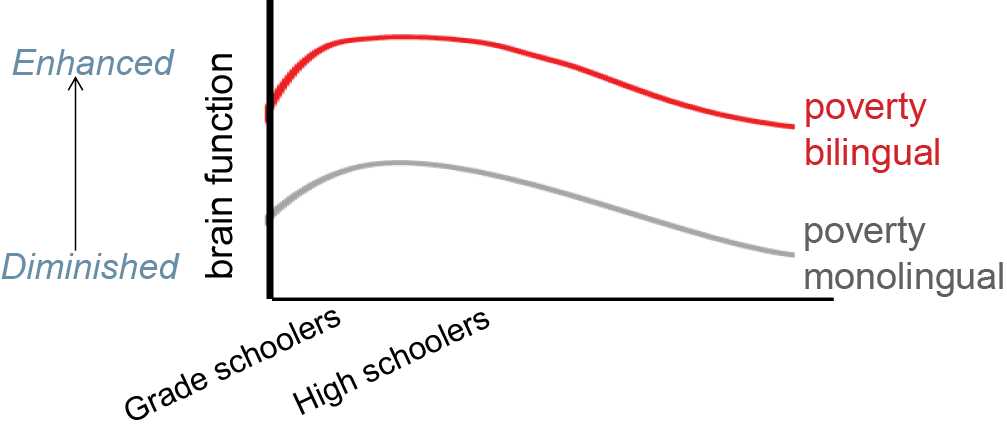
CONCUSSION
Making sense of sound is one of the hardest jobs the brain has to do, which is why this fast, delicate, and intricate ability can be disrupted by a head injury. Our research shows that concussion can disrupt sound processing in the brain and that processing improves as athletes recover.
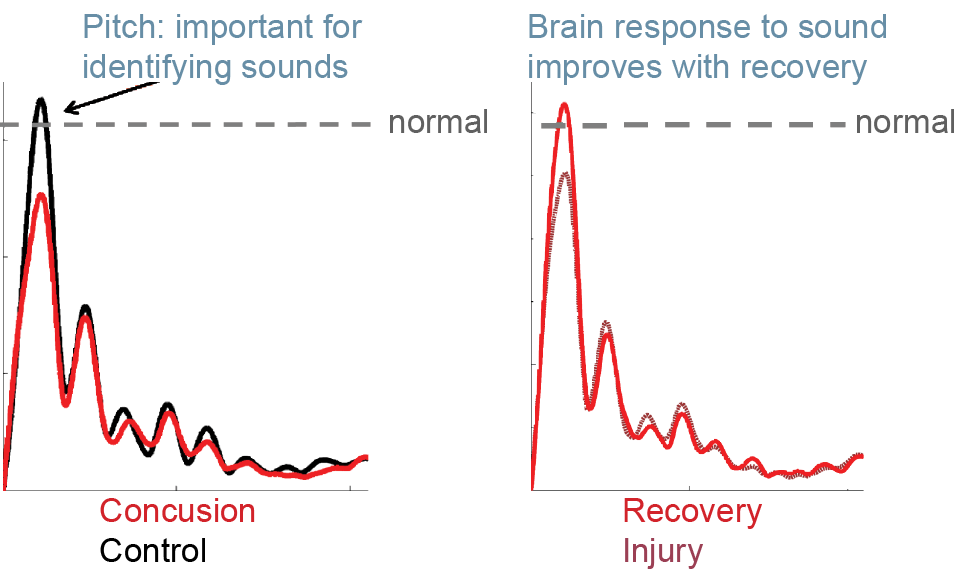
REFERENCES
MUSIC
- Bonacina S, Krizman J, White-Schwoch T, Kraus N (2018) Clapping in time parallels literacy and calls upon overlapping neural mechanisms in early readers. Annals of the New York Academy of Sciences. 1423: 338–348.
- Kraus N, White-Schwoch T (2017) Neurobiology of everyday communication: what have we learned from music. The Neuroscientist. 23(3): 287-298.
- Kraus N (2016) Music, hearing, and education: from the lab to the classroom. ENT and Audiology News. 25(4): 94-96.
- Kraus N, Strait DL (2015) Emergence of biological markers of musicianship with school-based music instruction. Annals of the New York Academy of Sciences. 1337: 163-169.
- Slater J, Skoe E, Strait D, O'Connell S, Thompson EC, Kraus N (2015) Music training improves speech-in-noise perception: longitudinal evidence from a community-based music program. Behavioural Brain Research. 291: 244-252.
- Tierney A, Krizman J, Kraus N (2015) Music training alters the course of adolescent auditory development. Proceedings of the National Academy of Sciences. 112(32): 10062-10067.
- Kraus N, Hornickel J, Strait DL, Slater J, Thompson EC (2014) Engagement in community music classes sparks neuroplasticity and language development in children from disadvantaged backgrounds. Frontiers in Psychology, Cognitive Science. 5(1403).
- Kraus N, Slater J, Thompson EC, Hornickel J, Strait D, Nicol T, White-Schwoch T (2014) Music enrichment programs improve the neural encoding of speech in at-risk children. Journal of Neuroscience. 34(36): 11913-11918.
- Kraus N, Slater J, Thompson EC, Hornickel J, Strait DL, Nicol T, White-Schwoch T (2014) Auditory learning through active engagement with sound: Biological impact of community music lessons in at-risk children. Frontiers in Auditory Cognitive Neuroscience. 8(351).
- Slater J, Strait DL, Skoe E, O’Connell S, Thompson EC, Kraus N (2014) Longitudinal effects of group music instruction on literacy skills in low-income children. PLoS One. 9(11): e113383.
- Slater J, Tierney A, Kraus N (2013) At-risk elementary school children with one year of classroom music instruction are better at keeping a beat. PLoS One. 8(10): e77250.
- Tierney A, Krizman J, Skoe E, Johnston K, Kraus N (2013) High school music classes enhance the neural processing of speech. Frontiers in Educational Psychology. 4(855).
BILINGUALISM
- Krizman J, Tierney A, Nicol T, Kraus N (2021) Listening in the moment: How bilingualism interacts with task demands to shape active listening. Frontiers in Neuroscience. 15: 717572
- Kraus N, White-Schwoch T (2018) Impact of life experiences on hearing in noise. Hearing Journal. 71(11): 46-47.
- Kraus N, Nicol T (2017) The power of sound for brain health. Nature Human Behaviour. 1: 700-702
- Kraus N, White-Schwoch T (2017) The bilingualism paradox. Hearing Journal. 70(1): 40-42.
- Krizman J, Bradlow AR, Lam SS, Kraus N (2017) How bilinguals listen in noise: linguistic and non-linguistic factors. Bilingualism: Language and Cognition. 20(4):834-843.
- Intartaglia B, White-Schwoch T, Meunier C, Roman S, Kraus N, Schön D (2016) Native language shapes automatic neural processing of speech. Neuropsychologia. 89: 57-65.
- Krizman J, Skoe E, Kraus N (2016) Bilingual enhancements have no socioeconomic boundaries. Developmental Science. 19(6): 881–891.
- Krizman J, Slater J, Skoe E, Marian V, Kraus N (2015) Neural processing of speech in children is influenced by extent of bilingual experience. Neuroscience Letters. 5: 48-53.
- Kraus N, Anderson S (2014) Bilingualism enhances neural speech encoding. Hearing Journal. 67(7): 40.
- Krizman J, Skoe E, Marian V, Kraus N (2014) Bilingualism increases neural response consistency and attentional control: evidence for sensory and cognitive coupling. Brain and Language. 128: 34–40.
- Krizman J, Marian V, Shook A, Skoe E, Kraus N (2012) Subcortical encoding of sound is enhanced in bilinguals and relates to executive function advantages. Proceedings of the National Academy of Sciences. 109(20): 7877-7881.
- Song JH, Skoe E, Wong PCM, Kraus N (2008) Plasticity in the adult human auditory brainstem following short-term linguistic training. Journal of Cognitive Neuroscience. 20(10): 1892-1902.
POVERTY
- Krizman J, Skoe E, Kraus N (2016) Bilingual enhancements have no socioeconomic boundaries. Developmental Science. 19(6): 881–891.
- Skoe E, Krizman J, Kraus N (2013) The impoverished brain: disparities in maternal education affect the neural response to sound. Journal of Neuroscience. 33(44): 17221–17231.
CONCUSSION
- Krizman J, Colegrove D, Cunningham J, Bonacina S, Nicol T, Nerrie M, Kraus N (2024) Concussion acutely disrupts auditory processing in Division I football student-athletes. Brain Injury. 1-9.
- Bonacina S, Krizman J, Farley J, Nicol T, LaBella CR, Kraus N (2024) Persistent Post-Concussion Symptoms Include Neural Auditory Processing in Young Children. Concussion. 28;9(1):CNC114.
- Bonacina S, Kraus N, Krizman J, Farley J, Nicol T, LaBella CR (2023) Concussion disrupts brain synchrony: Evidence from Interactive Metronome on young children with persisting symptoms and prolonged recovery post-concussion. Journal of Concussion. 7
- Kraus N, Colegrove D, Otto-Meyer R, Bonacina S, Nicol T, Cunningham J, Krizman J (2023) Subconcussion revealed by sound processing in the brain. Exercise, Sport, and Movement. 1(3): 1-4
- Krizman J, Bonacina S, Colegrove D, Otto-Meyer R, Nicol T, Kraus N (2022) Athleticism and sex impact neural processing of sound. Scientific Reports. 12:15181
- Kraus N, White-Schwoch T (2020) Concussion management: The role for audiology. Hearing Journal. 73(4): 44-45
- Krizman J, Lindley T, Bonacina S, Colegrove D, White-Schwoch T, Kraus N (2020) Play sports for a quieter brain: evidence from division I collegiate athletes. Sports Health. 12(2): 154–158
- White-Schwoch T, Krizman J, McCracken K, Burgess JK, Thompson EC, Nicol T, Kraus, N, LaBella CR (2020) Baseline profiles of auditory, vestibular, and visual functions in youth tackle football players. Concussion. 66:1-17
- White-Schwoch T, Krizman J, McCracken K, Burgess JK, Thompson EC, Nicol T, LaBella, CR, Kraus, N (2020) Performance on auditory, vestibular, and visual tests is stable across two seasons of youth tackle football. Brain Injury. 34: 236-244
- Kraus N, Krizman J (2018) An auditory perspective on concussion. Audiology Today.
- Kraus N, White-Schwoch T (2018) Concussions impair listening-in-noise abilities. Hearing Journal. 71(5): 44-46
- Kraus N, White-Schwoch T (2018) Impact of life experiences on hearing in noise. Hearing Journal. 71(11): 46-47.
- Thompson EC, Krizman J, White-Schwoch T, Nicol T, LaBella C, Kraus N (2018) Difficulty hearing in noise: a sequela of concussion in children. Brain Injury. 32:6 (763-769).
- Kraus N, Lindley T, Colegrove D, Krizman J, Otto-Meyer S, Thompson E, White-Schwoch T (2017) The neural legacy of a single concussion. Neuroscience Letters. 646: 21-23.
- Kraus N, White-Schwoch T (2017) Do concussions leave a lasting imprint on the hearing brain. Hearing Journal. 70(5): 42-45
- Kraus N, White-Schwoch T (2017) Listening to the brain to suss out concussions. Hearing Journal. 70(3): 56-57.
- Kraus N, Thompson EC, Krizman J, Cook K, White-Schwoch T, LaBella CR (2016) Auditory biological marker of concussion in children. Nature: Scientific Reports. 6: 39009.
For additional information, visit the Music, Neuroeducation, Bilingualism, Reading, and Concussion pages.
